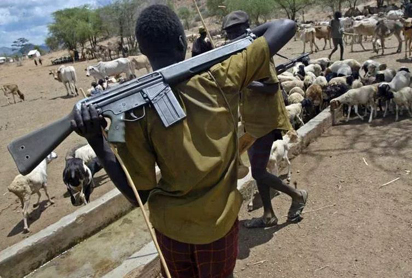On Wednesday last week, I was at the Enugu State High Court to attend a session. Shortly before 10am, a large number of prisoners, accompanied by their wardens, arrived.
The prisoners’ warden who came to our own courtroom with his wards stood with us in the corridor as the court was packed with lawyers, plaintiffs, respondents, court staff and other interested persons.
After a while, a discussion naturally came up about the menace of Fulani cattle herders all over the country. The prison warden who obviously hailed from Enugu State opened up and said the situation in the state was “horrible”.
“I went to my hometown last weekend. I was just resting in my room in the afternoon when, all of a sudden I started hearing “hm-hm-hm”. I looked out of my window into my garden. I was shocked at what I saw: cows everywhere! They were eating everything in the garden. I came out and saw three young Fulani men.
They were armed with AK-47 assault rifles, the type that we in the Service never have the opportunity to touch. The boys just looked at me and continued to mind their cows. There was nothing I could do because I knew they were ready to shoot at any slightest opportunity”.
Barely five days later on Monday, 25th April, there was breaking news all over the Internet on an outbreak of fighting between Fulani herdsmen and indigenes in Nimbo, Uzo Uwani Local Government Area, a northern precinct of Enugu State. According to the news which was later confirmed, seven villages in Nimbo (Nimbo Ngwoko, Ugwuijoro, Ekwuru, Ebor, Enugu Nimbo, Umuome, and Ugwuachara) were attacked by the herdsmen, leaving between 40 and 48 people dead (many with their throats slit, Boko Haram style) and over 60 injured. Residential homes and a church were razed. Indigenes of the community fled to nearby Nsukka town.
Can I hear you say: “Agatu season 2”?
Come to think of it: Agatu is not far from Uzo Uwani. Benue and Enugu share a common boundary. It would seem that, having “conquered” Agatu, the Fulani militia deployed to take over the South East. News had it that days to the attack, there were rumours that 500 heavily-armed Fulani militiamen were camped in the bushes ready to attack. The Directorate of State Service (DSS) under Director General, Alhaji Lawal Daura, did nothing about it. DSS could not re-enact the speed and expedition with which they allegedly discovered fifty corpses in shallow graves in Abia State, five of which they identified as being those of people of Fulani stock, though they did not tell us the ethnic background of the rest forty five dead men.
It was not until these vandals had despatched innocent and defenceless villagers to their early graves that we got reports of police and military deployment to the area. Perhaps, they were there to shut the stable door after the horse had escaped. That is the type of “law enforcement” the security agencies of this country are very good at providing.
Before now, people were asking who these “herdsmen” really were. For me, it is not just who they are that matters the most, as that is now obvious. What interests me more is: what really is their mission?
Even a cretin now knows that these are not the traditional Fulani cattle-herders we were all born to see grazing their cattle peacefully without molesting anyone or destroying anyone’s means of livelihood or attempting to displace indigenous populations from their homelands. Because they were peaceful, they were also allowed to ply their nomadic trade in peace. In fact, the nearby presence of the Fulani cattle herders meant easy availability of meat in our local markets.
But it also contributed negatively to the extinction of traditional animal farming, along with the rapid disappearance of local animal breeds, such as the evergreen forest goats, fowls, cows and guinea-fowls, which are more highly valued and nutritious. You cannot blame the cattle Fulani for the laziness in animal husbandry among the Southern peoples, along with the near-extinction of local breeds. You cannot blame the nomads for Southerners abandoning their local communities for the non-existent “luxuries” of the townships, which gave non-indigene and non-citizen interlopers to seek to annex lands belonging to locals for the gratification of their cows and the profit of cow owners in the North.
Indeed, this is where the problem is. These “herdsmen” are just the grunt workers; the foot soldiers of highly-placed individuals, such as emirs, titled men, retired generals, retired police chiefs, retired security chiefs, big politicians and businessmen in the North who are not ready to upgrade their animal farming practices to the more productive and modern strategy of ranching.
With climate change and desertification in the North, and the availability of cheap arms from wars in Libya, Chad, Mali and other places in the desert, sophisticated weapons are purchased and given to hired hands from all over the West African sub-region to move hungry cattle to Southern greener pastures. Minister of Agriculture in the All Progressives Congress (APC) Federal Government, Mr. Audu Ogbeh, disclosed that these militia men see themselves as Jihadists. Why else are they slitting throats and burning churches in Igboland? What do these have to do with cattle-herding?
I am afraid, people are being pushed to the wall. Let it be known that no one will allow any foreign invader to take over their homeland. People have run away, hoping the law-enforcement agents will do their work. When that fails, I am afraid we may see wars. People could be forced to go home and reclaim their communities with fire for fire. No tribe has the monopoly of military prowess. Those who start fights first don’t always win.
The Police, Army, DSS and other law enforcement agencies must move in decisively to protect Nigerians and preserve the peace, unity and stability of this country PRONTO!
Today, not tomorrow!



Leave a Reply